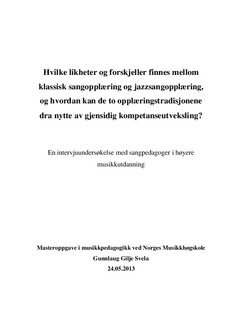| dc.description.abstract | This thesis examines the educational traditions within classical singing and jazz singing, with emphasis on similarities, differences and mutual exchange of competence. Four singing teachers in higher music education have been observed and interviewed, regarding the distinguishing features of their vocal tradition, as well as what they emphasize in their education. Important themes that appear in the survey concern apprenticeship, formal and informal learning, vocal technique, technical work with body, breath and support, improvisation, interpretation and pedagogic and didactic competence. The survey leans on theory that deals with apprenticeship and one-to-one vocal tuition in higher music education, as well as theory that concern important aspects of the educational traditions, in areas such as vocal technique, improvisation and pedagogical and didactic skills. The study points out important differences and similarities between the vocal traditions, and show that singers and singing educators can benefit from mutual exchange of expertise. The study also shows that both educational traditions emphasize work on singing technique and expression, but while the classical educators emphasize technical work, the jazz educators are more concerned with expression and improvisation. The jazz educators believe that jazz singers can benefit from knowledge of classical singing technique, and they also assume that it may be fruitful for classical singers to learn about improvisation. The classical educators believe that they might learn from jazz musicians in the area of rhythm. The study shows that even though apprenticeship learning characterizes the educational traditions, all four educators emphasize the students' personal, musical development. Both the classical pedagogues and the jazz pedagogues stress the importance of pedagogical insight, and notions such as trust, communication and motivation have great value. This study is particularly interesting for educators who teach classical singing and jazz singing, or across genres, as well as for singers and singing educators who want to add width to their expertise. | no_NO |
